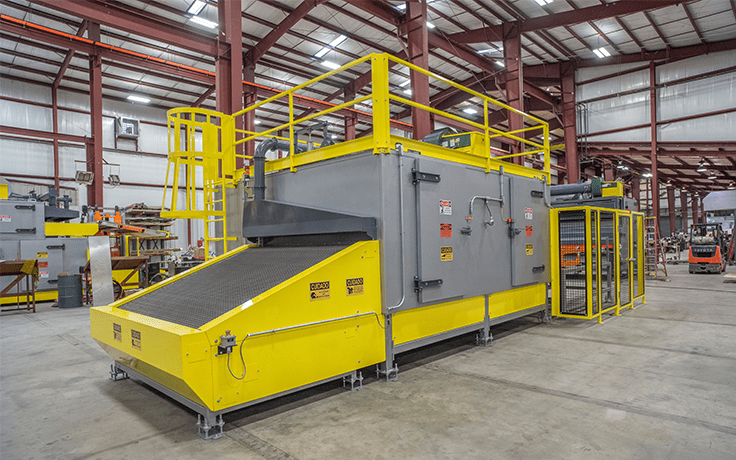Conveyor Oven Belt Materials & Their Applications
Designing a custom industrial conveyor oven involves the careful consideration of multiple factors. You must determine not only the oven configuration and belt type that most closely fit your needs, but also the best material to use for the belt itself.
From metals to fabrics, a variety of materials can be used to manufacture belts for conveyor ovens, depending on the oven’s purpose. Below, we examine seven of the most common materials used in conveyor oven belts, along with their applications.
High Carbon Steel
Carbon steel belts offer many benefits for industrial ovens, including durability, precision tracking, and belt straightness and flatness.
Carbon steel belts are also very hygienic thanks to their easy-to-clean and abrasion-resistant surfaces. As such, they are a popular choice for industrial ovens used in all stages of baking and food processing, including heating, cooling, drying, and even product transportation.
However, carbon steels rusts and discolors more easily than stainless steel.
Stainless Steel & Stainless Alloys
Stainless steel conveyor belts do not rust or corrode and need to be cleaned less frequently than belts made from other metals.
True to its name, stainless steel won’t rust or corrode like other metals so it doesn’t need to be cleaned often. This durability and corrosion resistance makes the material ideal for a large number of industries and applications, including plastic, lamination, wood, rubber, chemicals, and even food production.
Similar to stainless steel, stainless alloys don’t rust or corrode. They also offer several other benefits, such as being less expensive and easier to machine than stainless steels.
Rubber
Upon first consideration, rubber may seem like an unusual choice for an industrial conveyor oven belt since it can melt more easily than some of the other materials on this list. However, if rubber is treated properly it can withstand temperatures up to 450° F, making it an excellent choice for applications such as food production.
Plastic
Like rubber, plastic may also seem like a surprising selection for a conveyor oven belt, but this material works well for cooling chambers and other low-heat applications. Plastic is also a very cost-effective material since it lasts a long time and requires minimal maintenance.
Plastic conveyor oven belts are usually made of sections that are linked together, making it easy to remove and replace damaged modules, further reducing costs.
Polypropylene
Polypropylene is a specific type of thermoplastic polymer that is known for its wide range of applications.
When it comes to industrial ovens, polypropylene offers many of the same advantages as other types of plastic belts with several added benefits. In addition to being lightweight, sturdy, and flexible, polypropylene also resists water, mold, abrasion, chemicals, and corrosion, making it a very versatile material for conveyor oven belts.
Teflon-Coated Fabric
Conveyor belts made of fabric coated with Teflon are both non-stick and heat-resistant.
Fabric can also be used to create conveyor oven belts as long as it is coated with Teflon to make it non-stick and heat-resistant. In compliance with FDA rules, these types of belts are often used in industrial ovens designed for baking or drying applications in food production.
Woven PVC
Solid conveyor oven belts are also made using woven PVC material. Somewhat like the rubber belts mentioned above, conveyor belts made from PVC are treated with chemicals to make them fire-resistant and thus suitable for industrial ovens. As with rubber belts, drying and baking are also common uses for PVC conveyor oven belts.
Selecting the Right Material for Your Conveyor Oven Belt
The material used to manufacture a conveyor oven belt is just one factor you must consider when choosing an industrial oven, but it’s an important one. Each material has its own advantages and limitations, as well as a particular range of applications it is best suited for.
Custom building an industrial oven gives you control over not only the conveyor belt material but also a whole host of other choices, allowing you to design the oven to fit all your production needs.
With over 100 years of combined experience in designing and manufacturing conveyor ovens, Davron Technologies can advise you on all steps involved in building your own custom industrial oven. If you’d like to learn more about this process or simply have questions about choosing the right material for your conveyor oven belt, please contact us.
